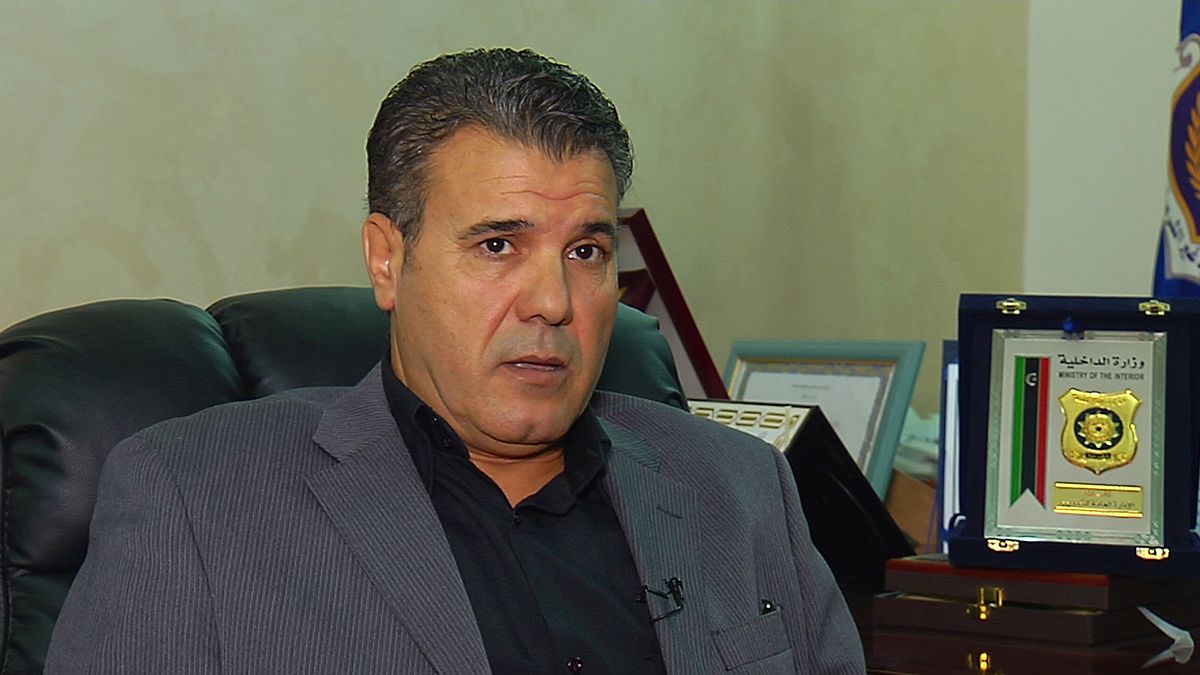Mohamed Swayib is the Head of DCIM, the department in charge of combatting illegal immigration in Libya. In an interview with Valérie Gauriat, he blames the international community for not implementi
*Video available in Arabic only
International cooperation with Libya to combat illegal immigration is the most sensitive issue for us, the Department for Combatting illegal immigration, and the Ministry of the Interior. All Libyan services were disappointed by the promises made by the European Union and IOM.
The Libyan state respected its international obligations. We have signed agreements with the Italian and European authorities to fight illegal immigration. And we spent a lot of money for that. But we see that the European Union does not really cooperate. There is a kind of negligence on the part of the European countries, except for Italy, the country most affected by immigration after Libya. But the fact that the EU, IOM, Frontex, and the United Nations are not complying with the agreements they have signed with the Libyan state on logistical, technical and financial aid has aggravated the problem.
There is an agreement between Libya, Italy and the EU to protect electronically the southern border of Libya, this is the most important point. This project can radically stop the problem of immigration, this can reduce by up to 90 percent the problem.
This agreement has been signed and is ready to be implemented through an Italian company, Silex. But after 2011, our repeated calls for help, especially to Italy, for immediate implementation, were ignored.
The European Union and especially France and Italy, which are more affected by immigration because of their southern border with the Mediterranean, are still trying to present Libya in a bad light, as a failed state. Why and how?
They want to put all the blame on Libya, which is not fair. Libya is only a transit country. Libya has 1050 kilometers of borders with Chad, 357 kilometers with Sudan and 350 kilometers with Niger. In total it is about 2000 kilometers, with the open desert in front. The heat is very high. Monitoring over such a distance and with this climate is very difficult. The United States, with all the means of surveillance that they have, have about 3169 kilometers of border with Mexico. Libya has twice as much distance to watch, with 6,000 kilometers of borders, including the 2000 kilometers with the Mediterranean Sea, and the borders with Egypt, Sudan, Chad, Niger, Algeria and Tunisia.
The United States mobilizes 17,000 policemen to control the border it shares with Mexico. And every day we see the difficulty of fighting illegal immigration there. Despite the enormous economic resources of the United States, which devote billions annually to the fight against immigration. Just for these 3000 kms. So imagine the difficulty for us, if we make the comparison with the United States. Libya is fighting in a space of 6000 kilometers. I stress the economic and financial difference between the two countries.
Unfortunately, the European Union and European countries are still trying to put Libya on the dock, and blame it for the loss of control over immigration. And this is not true, because we signed agreements with the EU, France and Italy, and with the IOM and the UN, to help us to combat this immigration, which did not concern us directly at the start.
If we talk about services that fight against illegal immigration, we can take the example of France. France has a huge military base in the area of Niger, Chad and Libya. And the immigrants just pass, right in front of the eyes of the French soldiers.
The other problem is that European countries do not cooperate with Libya, to put pressure on neighboring countries, Niger, Chad and even Mali. Niger, for example, has recently signed agreements with all countries in West Africa, which cancel the entry visa requirement in Chad. This facilitated the transfer of all these flows to Chad, but you can imagine that the people from Niger, Cameroon, or Somalia, do not leave their countries to settle in Chad. It is a political action that we Libyans consider a threat to our national security. It should not have happened. Especially when we know the political ties between Chad, Niger, Mali and France. The European Union has not intervened to block these agreements, which are directly linked to the phenomenon. On the other hand, we need a lot of things, starting from basic logistical support. We need training. Because of the economic crisis in Libya at the moment, the anti-immigration department has been running out of budget for two years.
All the policemen and Libyan soldiers who work with the clandestine immigration service and the Ministry of the Interior suffer from a lack of wages. They even work with their own cars. They are almost voluntary workers to stop illegal immigration to the Mediterranean. What I want to underline is that Libya will no longer be the policeman of Europe who works for free to arrest immigrants. Because simply there are no Libyans on the boats of migrants. So maybe you are wondering why we continue to work under such conditions?
Because the Libyan people will never accept that Libya becomes a crossroads for immigrants, or that they become Libyan citizens. Libya is a great country, respecting its obligations. It gives permission to remain on her territory as political refugees to whom she wants. She delivers visas to whomever she wants, and not who she does not want. But the hidden political goal of Europe, behind the crisis, is to turn Libya into a grey zone, to concentrate illegal migrants and keep them in Libya. This will never happen, simply because the Libyan people and the Libyan authorities will never accept it.
